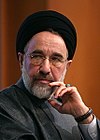Ghorbanali Dorri-Najafabadi
Ghorbanali Dorri-Najafabadi | |
|---|---|
 | |
| Attorney-General of Iran | |
| In office 23 August 2004 – 24 August 2009 | |
| Appointed by | Mahmoud Hashemi Shahroudi |
| Preceded by | Abdolnabi Namazi |
| Succeeded by | Gholam-Hossein Mohseni-Eje'i |
| Minister of Intelligence | |
| In office 19 August 1997 – 19 December 2000 | |
| President | Mohammad Khatami |
| Preceded by | Ali Fallahian |
| Succeeded by | Ali Younessi |
| Member of the Assembly of Experts | |
| Assumed office 23 February 1999 | |
| Constituency | Tehran Province |
| Majority | 2,056,427 |
| In office 21 February 1991 – 22 February 1999 | |
| Constituency | Ilam Province |
| Member of the Parliament of Iran | |
| In office 28 May 1992 – 18 August 1997 | |
| Constituency | Tehran, Rey, Shemiranat and Eslamshahr[1][2] |
| In office 28 May 1984 – 28 May 1988 | |
| Constituency | Tehran, Rey, Shemiranat and Eslamshahr[3] |
| In office 28 May 1980 – 28 May 1984 | |
| Constituency | Ardal[4] |
| Personal details | |
| Born | Hosseinali Dorri 3 December 1950 Najafabad, Isfahan Province, Iran |
| Alma mater | Qom Seminary |
| Website | www.dorri.ir |
Ghorbanali Dorri-Najafabadi (Persian: قربانعلی دری نجفآبادی; born 1950) is an Iranian politician and cleric, previously the Minister of Intelligence of Islamic Republic of Iran. He is the current head of Supreme Administrative Court.
Career
Dorri-Najafabadi was the minister of intelligence in the cabinet of then president Mohammad Khatami.[5] During his term of ministership, some journalists and reformist politicians were murdered by security agents, for which the Iranian government later charged his deputy, Saeed Emami, with orchestrating, claiming he had organized them independently. Dorri-Najafabadi resigned and was succeeded by Ali Younessi. The events were later named the "Chained Murders" by the reformist cabinet of President Mohammad Khatami.
After Mohammad Ismaeil Shooshtari, in 2005, he was the attorney-general of the Islamic Republic of Iran.[6][7] He was succeeded by Jamal Karimi-Rad in the post.
In 2008, he said that toys such as the Barbie doll are "destructive culturally and a social danger."[8]
See also
References
- ^ "Getting to Know the Representatives in the Majles" (PDF), Iranian Parliament, The Iran Social Science Data Portal, p. 403
- ^ "Getting to Know the Representatives in the Majles" (PDF), Iranian Parliament, The Iran Social Science Data Portal, p. 521
- ^ "Getting to Know the Representatives in the Majles" (PDF), Iranian Parliament, The Iran Social Science Data Portal, p. 183
- ^ "Getting to Know the Representatives in the Majles" (PDF), Iranian Parliament, The Iran Social Science Data Portal, p. 56
- ^ Gasiorowski, Mark J. (1 October 2000). "The power struggle in Iran". Middle East Policy. Retrieved 19 June 2013.
- ^ "Statement by Dorri Najabadi" (PDF). UN. 23 April 2005. Retrieved 19 June 2013.
- ^ ISNA - 2 December 2006 - 84/11/23 Archived 28 October 2006 at the Wayback Machine
- ^ "Iran calls for ban on Barbie doll". BBC News. 28 April 2008.
External links
- Use dmy dates from July 2013
- 1950 births
- Living people
- People from Rey, Iran
- Iranian Shia clerics
- Iranian ayatollahs
- Iranian Shia Muslims
- Members of the Expediency Discernment Council
- Members of the Assembly of Experts
- Representatives of the Supreme Leader in the Provinces of Iran
- Ministers of Intelligence of Iran
- Islamic Republican Party politicians
- Society of Seminary Teachers of Qom members
- Iranian politician stubs



